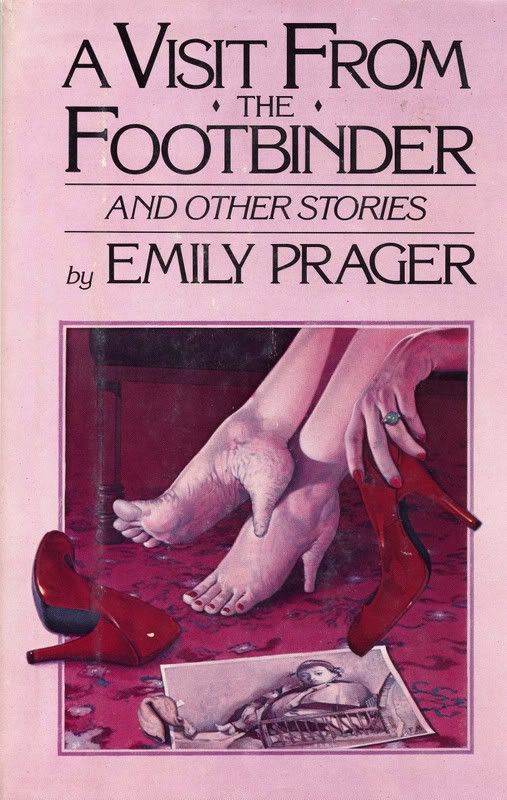Chinese mother stalls
the foot-binding of daughter,
hates to crush her joy.
When I was teaching high school English 15 years ago, one of my colleagues gave me a Xeroxed copy of a fabulous short story. It was about a young girl in ancient China who was about to have her feet bound.
I thought the title was "Visit from the Foot-binder," or "The Foot-binder's Visit" or something like that, and I had no idea who the author was. But I couldn't stop thinking about the story, and many times over the years, I tried to find it.
In particular, I remembered a conversation between the girl's parents, where her mother lashed out at her father for inflicting needless pain on such a free spirit, and the father said, "Hey! I'm not doing it! You don't want to bind her feet, don't bind them." Then the mother had to think about what that would mean -- her high-born daughter would be an unmarriageable peasant without status -- and she walked away, realizing she was choosing to inflict the pain. She, herself.
Last year, I read Snow Flower and the Secret Fan, by Lisa See, another book that featured footbinding, and again I remembered that Xeroxed story, and again I looked for it to no avail.
Then in June, one of my favorite bloggers wrote about Snow Flower. In my comment, I mentioned the story, and ... wonder of wonders! ... she found the title on Amazon.
Sure enough: A Visit from the Footbinder and other Stories by Emily Prager. It's long out of print, but I was able to buy a used copy. The lead story is, indeed, the story I remembered: about Pleasure Mouse, an exuberant, joyful child who never walks but runs, skips, dances, twirls, hops (kind of like my six-year-old son). Her mother, hating to crush the girl's spirits, delays her footbinding, and finally hires a professional even though the women in her family had always bound their daughters' feet themselves.
Reading the story again left me in awe of Prager's skills. It works on so many levels. It works as a simple story of ancient China. Even the descriptions evoke exquisite Chinese paintings (i.e. formal, stylistic descriptions of the gardens Pleasure Mouse plays in). It works as a study of human relationships, both healthy and controlling, independent and co-dependent.
But there is much I missed on the first read. The scene I remembered so well, for instance, in which the mother accepts her personal responsibility? Not quite as I remembered. Lady Guo Guo is much less noble than I remembered.
I had also forgotten the humor in the tiniest details (like the name Pleasure Mouse), and the darkly amusing games Pleasure Mouse's parents indulge in against each other.
And I missed entirely the scathing commentary about contemporary society. "The Visit from the Footbinder" is as much about modern notions of beauty, and the extremes people (women, especially) will go to, as it is about ancient China.

Of course, I never saw the cover of the book (the pink cover on the right). I would have caught the meaning if I had. Though modern high heels do not disfigure feet as much as footbinding, they certainly do cause problems.
The "Footbinder" story is definitely the highlight of the collection, though the other stories are also well worth reading. "The Lincoln-Pruitt Anti-Rape Device" is especially rich in irony and the blackest humor.
Prager is a skilled writer, indeed. I do not understand why she is not better known, much less why it was so difficult to find this exquisite short story.
If you can find a copy, I definitely recommend the read.

10/21/2009
06:08:54 AM